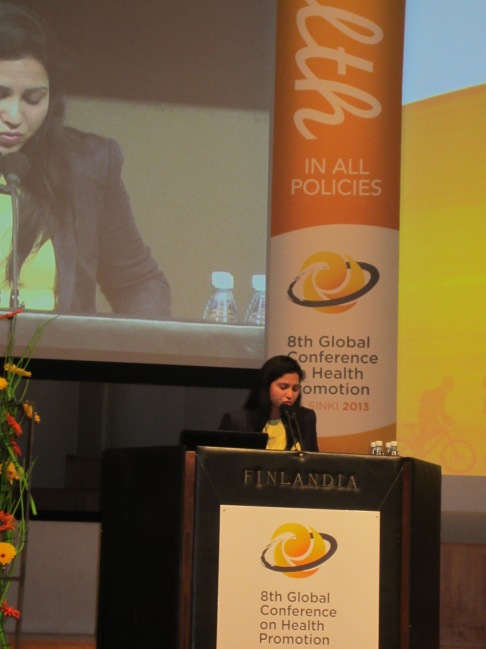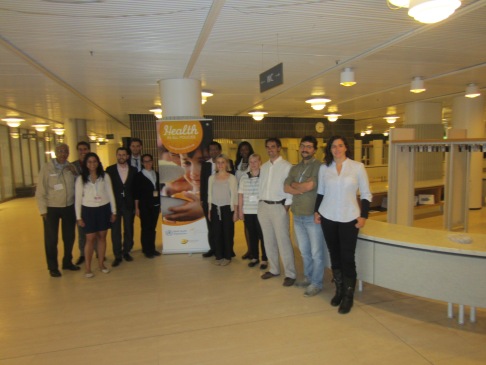Over the few past days, we have been lucky enough to attend the fifth World Health Summit, held in Berlin. This meeting gathers together hundreds of global health actors, leaders and stakeholders. The aim of the WHS is to improve health worldwide through catalysing collaboration and open dialogue thereby setting tomorrow’s agenda for improved research, education, health care and policy outcomes.
The WHS was preceded by the student satellite workshop, “Building future leaders, health in all policies” co-organised by bvmd-Germany, UAEM, IFMSA and EMSA. The agenda of the satellite event was broad but topics that featured particularly were Universal Health Coverage in the framework of the post 2015 agenda and global health education. Among other discussions, the idea of health in all policies and global health diplomacy were discussed at length, two concepts that we judge to be at heart of global health these days (and that we hope you will get to know better this year via the Think Global Initiative!).
So what is “Health in all policies.” This is a phrase who has be coined by WHO and aims to capture the notion that health is far-reaching (social determinants of health), well beyond the health sector and that health should be taken into consideration in policy development from all sectors. Contrasting health students’ ideas for policies in the areas of economics, water and education with those suggested by the United Nations allowed us to consider how other sectors consider health, coming to the conclusions that in general sectors are happy to siphon off areas of responsibility to the health sector if possible.
In our globalized increasingly complex and interdependent world, health has become an integral part of three global agendas: security, economic and social justice.
Global Health Diplomacy, on the other hand, ties together health and foreign policies. As developed by Ilona Kickbush – who was kind enough to give one of the students’ debriefings during the World Health Summit – global health diplomacy can be defined as the “multi-level and multi-actor negotiation processes that shape and manage the global policy environment for health”. Furthermore, in our globalized increasingly complex and interdependent world, health has become an integral part of three global agendas: security, economic and social justice. Many countries, including the United States, Norway, Japan and more recently Germany, have established national Global Health strategies and some even set up specialized offices.
However, it is easy to see that many questions arise around this topic: is global health diplomacy really serving for a better world or is it used to push a not-so hidden agenda? On the international level, global health diplomacy has become more prominent in the past two decades, especially with the international pledge to meet the millennium development goals by 2015, three of them being directly related to health issues. As members states and civil society are currently discussing the sustainable development goals (the famous post-2015 global agenda), we can only be sure that the concept of global health diplomacy will become more important as there is a growing awareness that investment in health is fundamental to economic growth and development, as the Oslo ministerial declaration of 2007 states.
We had the chance to further understand those two issues during the Summit itself, with a program jump-packed with various talks by diplomats, ministers, health leaders, global stakeholders. The different agenda items focused on themes such as research and innovation, education and leadership, evidence to policy, and global health for development. But educational as all the sessions clearly were, it was extremely refreshing to hear Sir Michael Marmot bring the discussion back to social determinants of health. Bold statements such as “I want to see economics debated as if people matter” resonated strongly with the youth contingent at the conferences and Sir’s closing statement of , “Do something, do more, do better” will continue to motivate us.
There is enough money to do whatever we want. We aren’t limited by resources but by their distribution. – Marmot
Youth engagement in the discussions was incredible with excellent quality of speeches and extreme respect for the voice of the youth demonstrating just how much young IFMSAers and other young students are contributing to the global health arena. Students asked questions, approached speakers and dominated the Twitter scene (check out #WHS13). In particular we appreciated the “New Voices for Global Health” sessions, where it was uplifting to hear about young health leaders trying to demystify the complexities of global health challenges: from the problem of access to healthcare in Nigeria to the place of health in the sustainable development negotiations.
So we had have learnt a lot, and fascinating global health debates took place. A few of the youth did begin to wonder what the utility of such gatherings is and how the WHS could become more action orientated. However, mostly we came to realise that we believe more than ever, that young and passionate medical students are shaping the global health agenda starting in their hometowns and universities. The next generation of global health advocates are not only thinking up new ideas but they are creative, solution-oriented, practical, innovative and actioned!
As Josko Mise, IFMSA President, said earlier this week, “Young people are not part of the problem; they are part of the solution.” Their ideas must be heard.
Claudel P-Desrosiers and Anya Gopfert
Think Global Initiative Coordinators 2013-2014
—
More info if you’re interested in Health in All Policies, the post 2015 discussions, and Global health diplomacy:
Health in all Polices:
- http://www.who.int/social_determinants/hiap_statement_who_sa_final.pdf
- http://www.hiap2013.com
- http://www.healthpromotion2013.org/
Global Health Diplomacy:
- http://www.who.int/bulletin/volumes/91/3/13-118596.pdf
- http://ifair.wordpress.com/2013/03/07/global-health-diplomacy/
Post-2015 & Sustainable Development:
- http://post2015.org/
- http://www.theguardian.com/global-development/2013/oct/21/united-nations-sustainable-development-goals
- http://sustainabledevelopment.un.org/
Ps. If you want to get involved with Think Global, drop us an email at thinkglobal@ifmsa.org !


